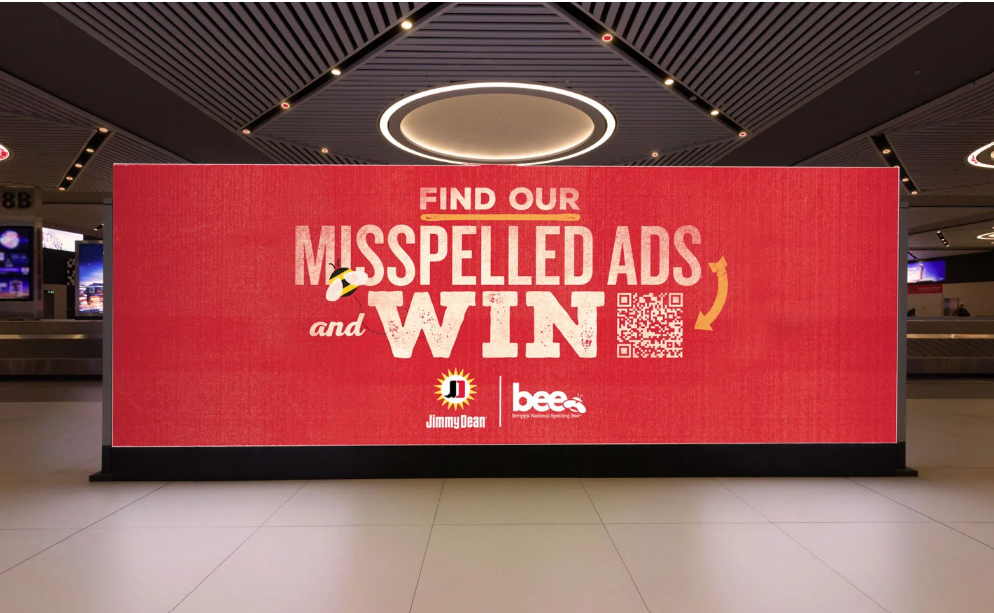Cereal brand Jimmy Dean creates a misspelled ads competition plus...4 more campaigns that leverage misspelling to drive home their message.
Advertising is a favourite target for grammar aficionados, but there's often a strategic reason for terrible spelling or incorrect-sounding grammar in ads.

Advertising is a favourite target for grammar aficionados, but there's often a strategic reason for terrible spelling or incorrect-sounding grammar in ads. By sounding incorrect, brands can shock us into paying attention or use such mistakes as a metaphor to land their message. Or in the example of the recently launched campaign by cereal brand Jimmy Dean, they can find a fun angle to be a partner of the trending cultural event that is Scripps National Spelling Bee competition.

To tie in with Scripps National Spelling Bee, breakfast brand Jimmy Dean and Ogilvy Chicago launched a fun scavenger hunt campaign this week. Using billboards placed across Washington, D.C. that feature intentional misspellings, the lucky participants who spot the mistakes win the chance of a free breakfast and a donation to support child literacy. It’s a smart tie up campaign pairing a hearty protein-packed breakfast designed to bring the best out of you with the whip smart requirements of being a spelling bee.
#TheMissingPeace | UN Women Lebanon | Leo Burnett | 2021

For years, the fate of Lebanon and its people has been in the hands of half of the population: Men. Indeed, at the time of the campaign, 50% of Lebanese society was not represented in peace building dialogues, as it was lacking women, who were excluded from decision processes that govern their lives. To show the world the true impact of excluding women from the dialogue, UN Women in partnership with Leo Burnett chose to partner with major media organisations to exclude 50% of letters from broadcast, print, and online communication coming out of Lebanon on one key day. And by doing so create a dysfunctional alphabet that acted as a metaphor for dysfunctional dialogue. In such a manner, UN Women Lebanon aimed to raise awareness on the importance of women’s engagement in peace and security deliberations within the country.
A1 Lappsus | A1 Hrvatska | Grey | 2019

75% of high schoolers have trouble with spelling. Yet they’re glued to their phones, checking them 150 times a day on average. This caused them to often be short of data, which was something their parents had little sympathy for. A1, a telco and digital services provider together with Grey its agency partner spotted this insight as an opportunity to engage with families in a fun and relevant way. They created an app that helps kids improve their spelling every time they open their phones. The catch: the teenagers unlock their phones by tapping a correctly spelled word. For every correct answer, A1 adds 1MB of free data to the users’ accounts. The campaign was a success with over 50.000 downloads in the first three weeks, making A1 Lappsus the most popular app in Croatia on Google Play at the time of release.
'Columbia' The Official Soccer Team of Confusion | Snickers | Proximity | 2018
Snickers was struggling to engage with the Colombian public and wanted to be relevant during the World Cup in Russia 2018 despite not being a sponsor. To do so it took advantage of one of the most confusing things people around the world do when they talk about Colombia. They say Columbia, not Colombia. Of course, this fabulous insight married perfectly with Snickers global comms platform ‘You Are Not You When You Are Hungry’. To advantage of this, Proximity Colombia created COLUMBIA, THE OFFICIAL SOCCER TEAM OF CONFUSION, a fake team that served to steal the conversation every time the national team took centre stage. The tactical activation was a big success increasing sales and achieving record levels of Snickers social engagement in the country.
Missing Type | NHS | Mediacom | 2017
In order to draw attention to blood donation and recruit more donors, this campaign removed the letters of the blood groups As, Os, and Bs from names, places, and brands that people engage with in everyday life. While this is wordplay and taps into popular culture, it is also a perfect example of a ‘competition: attribute in uncommon use’ template as defined by professors Goldenberg, Mazursky, and Solomon who together wrote a seminal, slightly unreadable, thesis on advertising.
